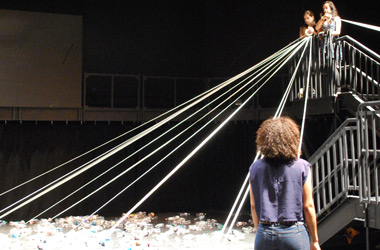“In nature, nothing exists alone,” wrote Rachel Carson in The Silent Spring, the 1962 best-seller often credited with launching the environmental movement.
The idea that events, natural and unnatural, have overlapping, interrelated consequences is behind a new year-long initiative on the UMass campus. The Academic Deans’ Theme engages departments and disciplines in diverse approaches to a common topic. The inaugural theme is the catastrophic Gulf oil spill caused by the explosion, two years ago this month, of BP’s Deepwater Horizon drilling rig, whose farreaching effects touch on numerous academic and research disciplines.
The UMass Theater Department has risen to the deans’ challenge by creating three original works that “map and explore our changing relationship to the natural world and offer models of community response to ecological crisis.” Beyond the Horizon is an exercise in “devised theater,” explains dramaturgy grad student Megan McClain, the project’s curator. The pieces were co-created by the participants—two dozen students from three of the Five Colleges—using research, found texts and their own words and ideas. This approach, says McClain, mirrors and extends the notion of interconnectedness in the campus-wide theme.
“I’m really interested in the teamwork that’s inherent in ensemble theater creation,” she says. “Everyone in the process has ownership of the work.” Fittingly for the deans’ interdisciplinary theme, the participants—actors, dancers, musicians and environmentalists—represent a variety of majors and interests. “Because many different points of view are incorporated into a devised project,” says McClain, “the people participating become citizen artists, and the piece becomes the culmination of many voices rather than the singular voice of one playwright.”
Each of the performances looks at one or more aspects of the Gulf disaster “and our evolving relationship to nature,” says McClain. What Have We Learned? uses letters, songs and other material to explore the oil spill’s human cost. To Whom It May Concern addresses “how we struggle to communicate during times of crisis in a world that’s already pulsing with the din of suffering.”
The third piece, Nightingale, is a post-apocalyptic fantasy connecting Hans Christian Andersen’s fairytale of that title to modern-day environmental pollution and media manipulation. McClain, who was the dramaturg for the piece, says the creative process was sparked by director Brianna Sloan’s interest in Rachel Carson and the author’s exposé of the noxious pesticide DDT, which at the time was falsely touted as harmless to humans.
“There was a stunning picture on the cover of Life magazine, of a model in a cloud of DDT spray, to show it was safe,” she says. “We thought, ‘What is this bizarre world where women are used to sell this kind of toxic product?’ We started generating ideas about who might populate a world where everything is toxic.” From these ideas and images, the group evolved characters for the piece, including a “toxic beauty queen” and Andersen’s nightingale trapped in an anti-natural world.
The performances, in the UMass Curtain Theater this week and next, are accompanied by post-show talkbacks with the creative teams and panel discussions with experts and activists (visit beyondthehorizonfestival.wordpress.com or umass.edu/theater for full info). There’s also a public reading of The Way of Water, a new work by Latina playwright Caridad Svich exploring the human toll of the disaster, at Amherst’s Food for Thought Books (April 10, 4:30 p.m., free).
Contact Chris Rohmann at StageStruck@crocker.com.



